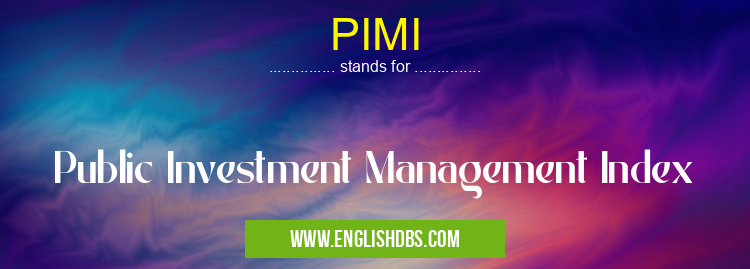What does PIMI mean in INVESTMENTS
PIMI stands for Public Investment Management Index. It is a comprehensive tool developed by the World Bank to assess the strength of public investment management (PIM) systems in developing countries.

PIMI meaning in Investments in Business
PIMI mostly used in an acronym Investments in Category Business that means Public Investment Management Index
Shorthand: PIMI,
Full Form: Public Investment Management Index
For more information of "Public Investment Management Index", see the section below.
» Business » Investments
What does PIMI measure?
PIMI measures the effectiveness of a country's PIM system across various dimensions, including:
- Planning and Budgeting: The efficiency and transparency of the planning and budgeting processes for public investments.
- Project Appraisal and Selection: The quality and objectivity of the methods used to evaluate and select public investment projects.
- Project Implementation: The effectiveness of project implementation and monitoring, including cost control and timely completion.
- Project Performance Evaluation: The ability to assess the impact and effectiveness of public investments.
- Public Investment Institutions: The capacity and accountability of institutions involved in PIM.
How is PIMI used?
PIMI scores provide policymakers and development partners with a benchmark for assessing the strengths and weaknesses of a country's PIM system. This information can be used to:
- Identify areas for improvement in PIM practices.
- Set priorities for capacity building and technical assistance.
- Track progress over time and compare performance with other countries.
Essential Questions and Answers on Public Investment Management Index in "BUSINESS»INVESTMENTS"
What is the Public Investment Management Index (PIMI)?
PIMI is a tool developed by the World Bank to assess the quality of public investment management systems in developing countries. It evaluates countries' performance in four key areas: planning and budgeting, project appraisal and selection, project implementation, and monitoring and evaluation.
Why is PIMI important?
PIMI helps countries identify weaknesses in their public investment management systems and prioritize areas for improvement. It provides a framework for countries to enhance the efficiency, effectiveness, and transparency of their public investments.
How is PIMI structured?
PIMI consists of 30 indicators organized into four dimensions:
- Planning and budgeting: Assesses the quality of planning and budgeting processes.
- Project appraisal and selection: Evaluates the criteria and methods used to appraise and select investment projects.
- Project implementation: Examines the efficiency and effectiveness of project implementation.
- Monitoring and evaluation: Measures the extent to which projects are monitored and evaluated for performance and impact.
How are countries scored on PIMI?
Countries are scored on a scale of 1 to 4 for each indicator, with 4 indicating the highest level of performance. The overall PIMI score is calculated as the average of the scores across all indicators.
What benefits can countries derive from using PIMI?
By using PIMI, countries can:
- Benchmark their public investment management systems against international best practices.
- Identify areas for improvement and prioritize reforms.
- Enhance the efficiency, effectiveness, and transparency of their public investments.
- Improve the quality and sustainability of public infrastructure and services.
Final Words: PIMI is a valuable tool for countries seeking to improve the efficiency and effectiveness of their public investment management systems. By identifying areas for improvement, PIMI can help governments prioritize their efforts and make better use of public resources.
